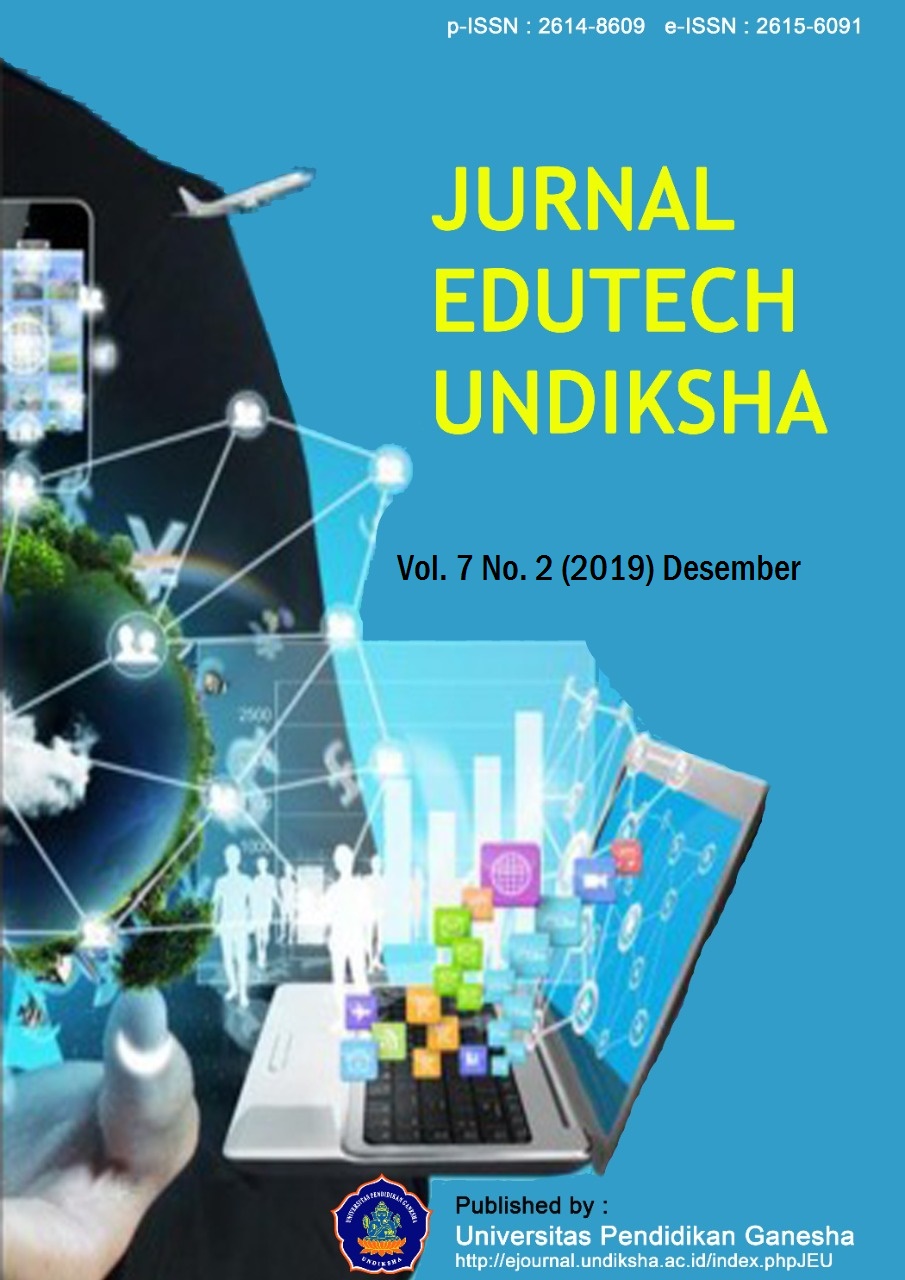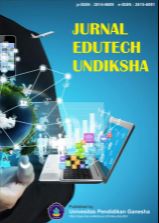PENGEMBANGAN E-MODUL AGAMA HINDU UNTUK SISWA KELAS V SDN 5 KAMPUNG BARU
DOI:
https://doi.org/10.23887/jeu.v7i2.21668Abstract
Perkembangan teknologi telah memenuhi aspek pendidikan yang dimanfaatkan untuk membuat media pembelajaran. Namun kenyataannya, SDN 5 Kampung Baru masih minim media pembelajaran yang digunakan. Pengembangan media berupa E-Modul khususnya mata pelajaran Agama Hindu dilakukan. Penelitian ini bertujuan untuk (1) mendeskripsikan rancang bangun E-Modul, (2) mendeskripsikan kualitas hasil validitas pengembangan, dan (3) mengetahui efektivitas E-Modul. Ini adalah penelitian dan pengembangan model ADDIE. Teknik pengumpulan data yaitu dengan metode wawancara, pencatatan dokumen, kuesioner, dan tes objektif pilihan ganda. Analisis data menggunakan analisis deskriptif kualitatif, deskriptif kuantitatif, dan statistik inferensial (uji-t). Hasil penelitian yaitu (1) Rancang bangun E-Modul Agama Hindu dengan model ADDIE. (2) E-Modul Agama Hindu valid dengan: (a) hasil review ahli isi mata pelajaran menunjukkan E-Modul berpredikat sangat baik (91,66%), (b) hasil review ahli media pembelajaran menunjukkan E-Modul berpredikat baik (87,58%), (c) hasil review ahli desain pembelajaran menunjukkan E-Modul berpredikat baik (87,05%), (d) hasil uji perorangan, uji kelompok kecil, dan uji lapangan menunjukkan E-Modul berpredikat sangat baik (95,4%, 91,41%, 91,37%). (3) E-Modul Agama Hindu efektif meningkatkan hasil belajar siswa (thitung = 3,226 > ttabel = 2,042 pada taraf signifikansi 5%). Ini berarti bahwa E-Modul mata pelajaran Agama Hindu terbukti efektif secara signifikan meningkatkan hasil belajar mata pelajaran Agama Hindu siswa.Kata Kunci : ADDIE, E-modul, pengembangan
The technology development has fulfilled educational aspects which used to create learning media. However, in fact, SDN 5 Kampung Baru still lacks of learning media used. Developing media of E-Module especially Agama Hindu subject was carried out. This study aimed at (1) describing the E-Module design, (2) describing the quality of the development validity results, and (3) determining the effectiveness of the E-Module. This was research and development of ADDIE model. The data collection techniques were interview, document recording, questionnaire, and multiple-choice test. Data analysis used were qualitative descriptive, quantitative descriptive, and inferential statistics analysis (t-test). The results of this study found (1) Agama Hindu E-Module design with ADDIE model. (2) Agama Hindu E-Module was valid with: (a) the results of expert review of subject content showed Agama Hindu E-Module were very good (91.66%), (b) the results of the E-Module instructional media expert showed a good product (87.58%), (c) the results of review of learning design experts showed E-Module was good (87.05%), (d) results of individual trials, small group trials, and field trials showed E-module were very good (95.4%, 91.41%, 91.37%). (3) Agama Hindu E-Module effectively improved students’ learning outcomes (tcount = 3.226> ttable = 2,042 at significance level of 5%). It means that Agama Hindu E-Module was proven to be effective in significantly improving students’ learning outcomes in Agama Hindu subject.
keyword : ADDIE, E-module, development.
Downloads
Published
2019-11-28
How to Cite
putra, I. G. W., Agung, A. A. G., & Suwatra, I. I. W. (2019). PENGEMBANGAN E-MODUL AGAMA HINDU UNTUK SISWA KELAS V SDN 5 KAMPUNG BARU. Jurnal Edutech Undiksha, 7(2), 1–13. https://doi.org/10.23887/jeu.v7i2.21668
Issue
Section
Articles
License
Authors who publish with the Jurnal EDUTECH Undiksha agree to the following terms:
- Authors retain copyright and grant the journal the right of first publication with the work simultaneously licensed under a Creative Commons Attribution License (CC BY-SA 4.0) that allows others to share the work with an acknowledgment of the work's authorship and initial publication in this journal.
- Authors are able to enter into separate, additional contractual arrangements for the non-exclusive distribution of the journal's published version of the work (e.g., post it to an institutional repository or publish it in a book), with an acknowledgment of its initial publication in this journal.
- Authors are permitted and encouraged to post their work online (e.g., in institutional repositories or on their website) prior to and during the submission process, as it can lead to productive exchanges, as well as earlier and greater citation of published work. (See The Effect of Open Access)














